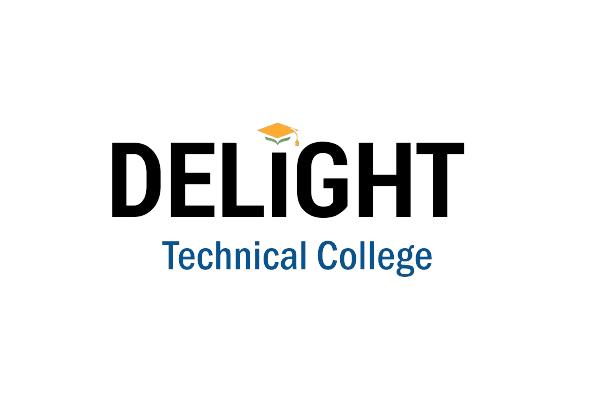Delight Technical College vs. Online-Only TVET Programs

🏫 1. Mode of Learning
Delight Technical College:
- In-Person Learning: Delight offers a traditional campus-based learning experience where students attend classes, engage in practical sessions, and interact directly with instructors and peers. This mode allows for hands-on training, particularly important for technical and vocational education, where practical skills are key.
- Blended Learning Options: Delight also offers blended learning opportunities for students who may need flexibility, combining in-person classes with online modules.
Online-Only TVET Programs:
- Fully Remote: Online-only TVET programs are entirely remote, meaning students attend virtual classes, submit assignments online, and engage with instructors and peers through discussion forums or live webinars.
- Flexible Schedule: Online programs allow students to learn at their own pace, offering a high degree of flexibility in terms of when and where to study. This is ideal for individuals who have other commitments (work, family) or those who cannot relocate to a physical campus.
Key Takeaway: Delight Technical College offers a more interactive and hands-on learning environment, which is crucial for TVET students. Online-only programs offer flexibility but may lack the practical training and direct mentorship available in traditional settings.
🧑🏫 2. Practical Training Opportunities
Delight Technical College:
- Hands-On Learning: One of the strongest advantages of studying at Delight is the practical, hands-on experience students get. Many technical and vocational courses, such as those in engineering, fashion design, and digital media, require students to practice skills using real equipment and industry-standard tools.
- Laboratory and Workshop Access: Delight students have access to well-equipped labs and workshops, which allow them to apply theoretical knowledge in practical settings.
Online-Only TVET Programs:
- Limited Hands-On Experience: While some online-only programs do offer virtual labs or simulations, they cannot replicate the physical experience of working with real-world equipment. This can be a limitation, especially for courses that rely heavily on practical skills (e.g., mechanical engineering, hairdressing, construction).
- Practical Assignments: Some online programs may require students to complete practical tasks at home or at local partner institutions, but the lack of direct access to equipment can limit the depth of the training.
Key Takeaway: Delight Technical College offers superior practical training that is essential for technical education, whereas online programs may struggle to provide the same level of hands-on experience, which is critical in many TVET fields.
🌍 3. Accessibility and Flexibility
Delight Technical College:
- Location-Based: Delight’s physical campus is based in Nairobi, which means students need to relocate or commute to the campus, especially for international students or those from other regions in East Africa.
- Fixed Class Schedules: Traditional in-person classes have fixed schedules, which can limit flexibility for students who may need to balance education with work or family commitments.
Online-Only TVET Programs:
- Global Accessibility: Online programs are accessible to students worldwide, as long as they have an internet connection. This is particularly beneficial for international students who cannot relocate.
- Flexible Learning: Online-only TVET programs are often more flexible, allowing students to choose their own study hours and learn at their own pace. This model works well for students with busy schedules or those who need to work while studying.
Key Takeaway: Online programs offer more flexibility and accessibility for students who need to learn from anywhere or balance other commitments. However, Delight provides an immersive campus experience that can offer valuable networking and industry connections.
💡 4. Cost and Affordability
Delight Technical College:
- Tuition Fees: Delight offers competitive tuition rates, which can vary based on the program but tend to be affordable compared to many other private institutions. Costs for accommodation, meals, and transport should also be considered.
- Additional Costs: For in-person learning, students may incur additional expenses such as transportation to and from campus, student activities, and learning materials (books, tools, equipment).
Online-Only TVET Programs:
- Lower Tuition Fees: Online-only programs often come with lower tuition fees because they don’t require maintaining a physical campus or facilities. This makes online education an affordable option for many students.
- Self-Funding for Learning Tools: Depending on the program, students may need to invest in their own tools or equipment (such as computers, software), but this can be more cost-effective than commuting or renting accommodation near a physical campus.
Key Takeaway: Online-only programs tend to be more affordable in terms of tuition fees, but the hidden costs of self-funding equipment or missing out on hands-on training may add up. Delight offers a balance of cost and practical experience, which may provide greater value for students in technical fields.
🏆 5. Industry Recognition and Job Placement Support
Delight Technical College:
- Strong Industry Ties: Delight has established strong partnerships with local industries and businesses in fields such as engineering, ICT, and fashion design. These connections often lead to internship opportunities and increased chances of employment upon graduation.
- Career Services: Delight offers career support, including job placement assistance, internships, and networking events, helping students transition smoothly into the workforce.
Online-Only TVET Programs:
- Variable Industry Connections: While some online programs partner with industries for internships or job placements, these connections may not be as strong or widespread as those available at traditional institutions like Delight.
- Limited Networking Opportunities: Online learning often lacks the face-to-face networking opportunities and industry exposure that come with attending a physical campus. Networking through virtual events or forums can be more challenging.
Key Takeaway: Delight offers strong industry ties and job placement support, which can enhance employment prospects. Online programs may not have the same level of industry access, making in-person education potentially more beneficial for career prospects.
🌱 6. Student Experience and Networking
Delight Technical College:
- Campus Life: Delight provides a rich student experience with opportunities for social interaction, extracurricular activities, and community engagement. Students can form connections with peers, instructors, and industry professionals, creating a vibrant learning environment.
- Peer-to-Peer Learning: Students benefit from group work, peer-to-peer collaboration, and mentorship opportunities that can enhance their educational experience.
Online-Only TVET Programs:
- Limited Social Interaction: While online programs have discussion boards, chat groups, and virtual meetings, they lack the same level of face-to-face interaction that can be key for building relationships and a support network.
- Self-Motivated Learning: Online students must be more self-disciplined and may miss out on the peer support and motivation that in-person learning provides.
Key Takeaway: The student experience at Delight is richer, with opportunities for networking and social engagement, while online programs tend to be more isolated and may lack the same community atmosphere.
Conclusion: Which Option is Right for You?
- Delight Technical College is ideal for students who value hands-on learning, industry connections, and a campus-based experience. If you’re pursuing a technical field where practical experience is crucial, Delight’s in-person learning environment offers significant advantages, particularly with its strong focus on job placement support and networking opportunities.
- Online-Only TVET Programs are best suited for students who need flexibility or are unable to relocate. They offer affordable tuition, the ability to learn from anywhere, and a self-paced learning environment. However, online programs may lack the practical training and direct industry connections found in traditional in-person learning.
Your choice will depend on your priorities, whether it’s flexibility, cost, or the opportunity for practical experience and industry connections.



